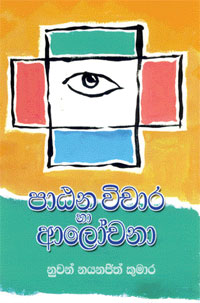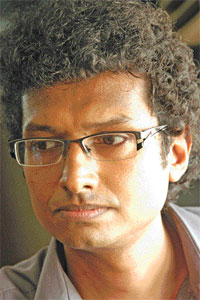Critical controversy
Nuwan in search of a new arena in literary criticism
:
If there is any religion that could cope
with modern scientific needs it would be Buddhism
-
Albert Einstein
Ruwini JAYAWARDANA
Many might not have met him in person but there is hardly an art
enthusiast who do not know him by name. As a journalist, critic and
University visiting lecturer, Nuwan Nayanajith Kumara has carved a niche
in the local arts stream which many would find hard to perfect or
surpass.
 Having
already scripted six books which provide an in-depth study to various
aspects of literature Nuwan is now getting ready to launch his seventh
volume: Pataka Vichara Saha Alochana. The book provides knowledge on
reading, criticism and insight to various aspects of literary works from
films, teledramas and stage dramas to books reviews and literary
speeches. It is a Sarasavi Publication. Having
already scripted six books which provide an in-depth study to various
aspects of literature Nuwan is now getting ready to launch his seventh
volume: Pataka Vichara Saha Alochana. The book provides knowledge on
reading, criticism and insight to various aspects of literary works from
films, teledramas and stage dramas to books reviews and literary
speeches. It is a Sarasavi Publication.
Many articles that Nuwan had penned for newspapers, tabloids,
magazines and research articles will be discussed. The book is an
attempt to take another step further in his initial discussion of
imprinting a Lankan identity in the critical methodology system: an
effort he took on with his fifth book Gaddarika Pravahaya Hevath Sukiri
Batillanga Lokaya.
"Bartha Murthi and Anandavartha's critical analysis of Indian
Sanskrit work influenced our literary thinking. Later we were introduced
to I A Richard's practical criticism which was taken up by F R Levis at
Cambridge University. A M G Sirimanna of the Kelaniya University's
English Department played a key role in introducing this system to Sri
Lanka while E F C Ludowyk put these ideologies to practice. Therefore
the final result was a methodological system which was a mixture of the
Indian Sanskrit system and the West," Nuwan explained.
|

Nuwan Nayanajith
Picture by Ruwan de Silva |
Two Sri Lankan scholars opined against the prevailing system. They
are Ediriweera Sarachchandra and Martin Wickramasinghe. They stressed on
the need for a Sinhala critical methodology.
With change many systems made their presence felt. The scientific
point of view emerging from Charles Darwin's anthropology prevailed
while some turned towards T S Eliot's humanity point of view. Carl Marx
introduced socialism in 1980 and with that many turned to Marxist
critical methodology including Professors Sucharitha Gamlath and
Piyaseeli Wijegunasinghe. In 1990 post-modernism took over; X group and
others began practising these theories. However these theories were
unable to withstand the waves of change. Many including those in the
West began looking for the answer to this situation.
In 1960 Needham University, USA, questioned why the Sri Lankan
universities cannot get together and build a system out of Buddhist
philosophy. However local intellectuals were not ready to take up the
challenge as they were overly involved in various temporary methodology
systems borrowed from various cultures.
"I stressed these issues in Gaddarika Pravahaya . We need to find a
methodology of our own based on the Buddha's teachings. They are
timeless and have proved that they can withstand social change. They
embody values of human reality. We do not have to reach far to obtain a
system which can withstand modernization. We have the ideals at our
fingertips," said Nuwan who is also a SIGNIS Cyril B Perera
Commemorative Award winner.
Another significant aspect linked with Nuwan's latest book is that is
father Ranjith Kumara had designed his book cover. Ranjith had designed
book covers for many popular writers in the past including K Jayatilleke.
Pataka Vichara Saha Alochana will see the light of day at the Library
and Documentation Services Board Auditorium, Colombo, on December 15 at
3 pm. The event will be sponsored by Pansilu Kala Kendra and presided by
Silumina Editor Karunadasa Sooriyaarachchi.
Colombo University Sinhala Department Head Ven Agalakada Sirisumana
and Prof Carlo Fonseka will deliver speeches. Vajira Jayawardene will
compere the event.
|



